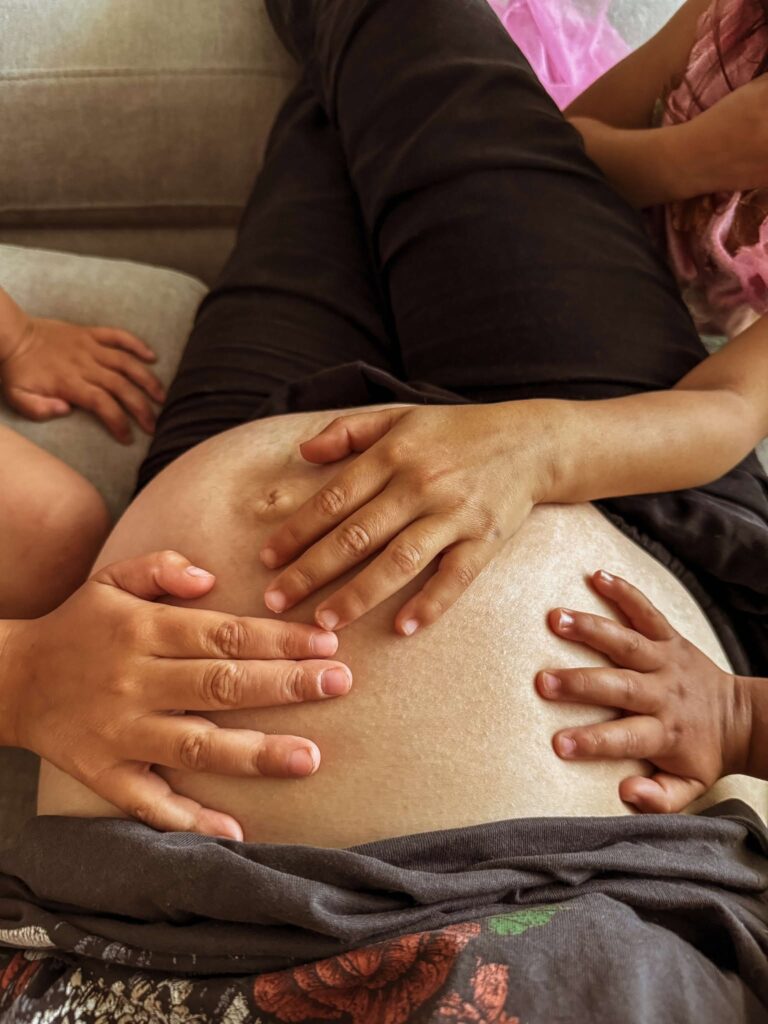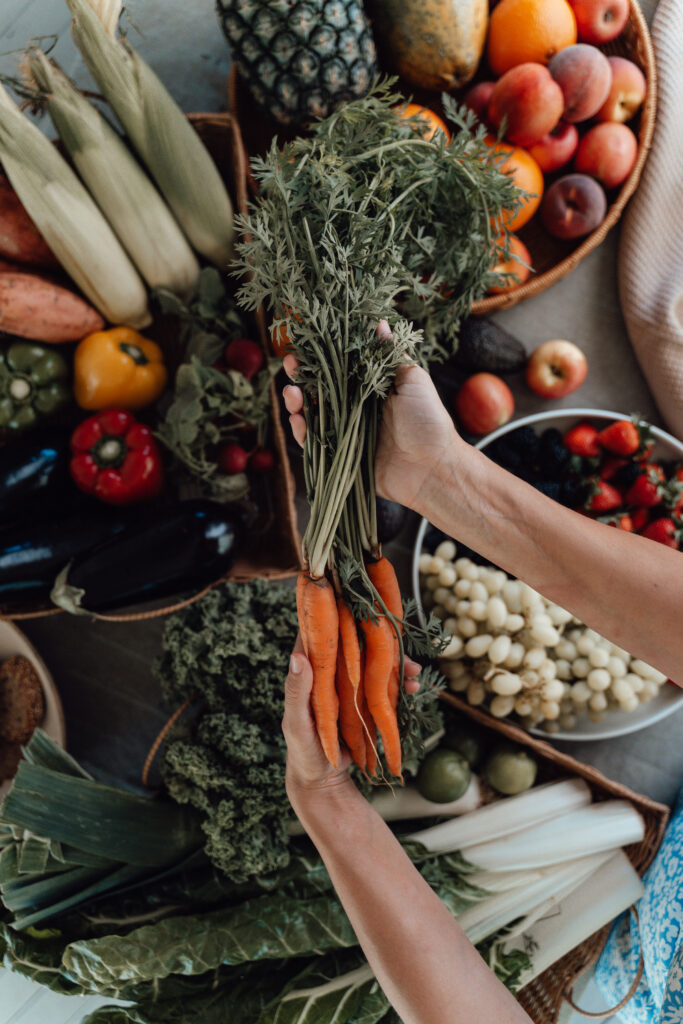As a Holistic Nutrition Consultant for pregnancy, I have learnt the power of being informed about your choices in pregnancy. Many women are advised to take great precaution in what to eat and not eat during pregnancy, so I want to share 10 myths about pregnancy nutrition with science to prove it.

Here’s a little story about my first pregnancy compared to my fourth pregnancy.
When I was first pregnant, I was a young 23 year old who went with the flow, listened to some birthing podcasts, ate fairly well, exercised when I could and did what the doctor advised. My doctor’s advice: take folic acid, avoid soft cheeses and meats and raw fish. That was it.
Fast forward to five years later, when pregnant with my third baby, I studied holistic nutrition for pregnancy and my eyes were open. The precautions medical professionals often tell us as pregnant women are based on very small risk factors. Sure, I understand the need to mention the importance of eating a balanced diet and avoiding alcohol. However, the emphasis on the avoidance of other foods like soft cheese, soft meat and raw fish has been blown up way out of proportion, in my honest opinion.
Now, I am pregnant with my fourth baby and feel confident more than ever about what I can put in my mouth and what I should minimise.
What I will cover in this post
- Being informed over fearing the worst case scenario
- 10 myths about pregnancy nutrition
- Healthy habits to reduce risk

Being informed over fearing the worst case scenario
When it comes to conventional guidelines on what to avoid during pregnancy, there are certainly sound, evidence-based recommendations. However, there are plenty of foods and substances that can be consumed with caution and mindfulness.
It is interesting to note that women all around the world are advised against different things. For instance, Italian pregnant women are often told that unwashed produce can carry listeria, while American and Australian pregnant women are not often aware of this. While Italian pregnant women are most likely to consume alcohol (just over 18%), while only 0.1% of Swedish pregnant women consume alcohol while pregnant (study).
It is important to weigh up the risks against the benefits, but this post is to simply give you the facts so that you decide what is best for your pregnancy.
It is believed that a pregnant woman’s immune system is suppressed as a protective mechanism so that the mother’s body does not reject the baby as a foreign object. However, researchers are beginning to reject the idea of pregnancy as a state of immunosuppression. Rather, pregnancy is a unique immune condition that is modulated, but not suppressed (study).
Regardless, during pregnancy women are more susceptible to illness, which is why precaution is needed when eating certain foods, but can be consumed with caution.
10 Myths about Pregnancy Nutrition
Here I will list 10 myths about pregnancy nutrition. As I have mentioned, I am writing this to lay out the facts so you know exactly the kind of risks there are when it comes to eating certain foods. However, many of these risks are extremely small, so being hyperaware of them is not necessary.
I have had five pregnancies (one ended in a miscarriage), and I have never had an issue eating the below foods (just so you know where I am coming from).
Here are the myths about pregnancy nutrition that you should know:
- Eating sushi is more dangerous than unwashed produce: in fact, unwashed leafy vegetables have been responsible for more foodborne illnesses than any other commodity (study).
- Pre-cut produce are at much higher risk of contamination
- Buying whole and cutting prior to eating reduces risk
- Pre-cut is safest if planning to cook before eating.
2. Eating conventional eggs is just as safe as eating organic eggs during pregnancy: studies have shown that the prevalence of salmonella is lower in certified organic eggs than conventional eggs (study). This is because conventional chickens are raised in very close quarters where infection can spread quickly. This is often why farmers give their chickens antibiotics.
- If possible, eat organic eggs over conventional eggs.
3. The negative effects of mercury levels in most fish outweigh the benefits of eating fish during pregnancy: Fish is a rich source of selenium (which is a common deficiency in most pregnant women), which has been shown to have a protective effect against the toxic effects of mercury by reducing its biological availability (study).
The risks of excess mercury in fish eaten by pregnant women are due to more mercury than selenium, which can have adverse outcomes for a baby. However, studies of populations exposed to mercury in selenium-rich ocean fish have seen improved outcomes instead (study).
- Consume low mercury fish often
- Consume fish with moderate levels of mercury occasionally
- If you don’t eat fish, take a high quality fish oil supplement (I recommend this one).
4. Pregnant women must avoid sushi with raw fish: Because of the strong food safety controls and consistent access to fresh-caught seafood in Australia (source), pregnant women who eat raw fish are not usually in harm’s way. This is also because in Australia, fishmongers have a strong relationship with their suppliers, ensuring that they can trust their handling methods (source). In the US, raw fish must be flash frozen to destroy parasites before it is served.
Pregnant women are more likely to get sick from eating chicken than from eating raw fish.
The risks of eating sushi with raw fish are reduced when:
- purchased from a reputable establishment
- ensuring that it is stored properly (and not eaten at a buffet)
- consuming directly after purchasing.
5. Pregnant women should avoid all deli meats: While there are certainly risks of contracting listeria from deli meats, the risk is very low. In Australia since 2001, there have been 0-14 cases of listeriosis in pregnant women each year (source). If you source your deli meat from a reputable establishment, keep it refrigerated at an optimal temperature and eat it straight out of the fridge, then I would say it is safe to eat.
6. Pregnant women must avoid all soft cheeses: soft cheeses like brie, camembert, fetta and ricotta are classified as soft cheese in Australia. Because most soft cheeses come from pasteurized milk, the process of pasteurisation kills off pathogens anyway. However, there is a very small risk of re-contamination during the maturation process (source).
Like with deli meat, the risk of contracting listeria from soft cheese during pregnancy is so small that if it comes from a reputable establishment and is refrigerated and eaten straight away, then I don’t believe it should be avoided altogether.
7. All caffeine should be avoided during pregnancy: One study found that 200mg or more of caffeine consumption during pregnancy doubles the risk of miscarriage (study). Pregnant women also metabolise caffeine at a much slower rate than non-pregnant women.
However, consuming lower doses of caffeine a day has not shown to be harmful to the mother and baby. Here is what is currently recommended:
- Coffee consumption (0-150mg daily)
- Black tea consumption (60mg daily)
- Caffeinated soda (40-80mg daily)
- Dark chocolate (5-35mg daily)
- Headache medicine (65-130mg daily – ensure that your headache medicine is compatible with pregnancy)
The conclusion is, it is okay to have low to moderate levels of caffeine during pregnancy.
8. Pregnant women should avoid drinking kombucha: this is often a recommendation due to kombucha containing caffeine and alcohol. However, kombucha has an average of 10mg caffeine (compared to coffee which has 100mg) and the alcohol levels in kombucha sold at supermarkets are monitored and often not present.
If you like to drink kombucha (like me), then I suggest diluting it with 1 part kombucha to 2 parts sparkling water.
9. Pregnant women should not drink unpasteurised juice: while unpasteurised juice made at a cafe or juice shop may carry levels of risk, this is mostly due to the juice being made from pre-cut produce and the fruit being left in the juicer without being properly cleaned.
If you like to drink unpasteurised juice (which is certainly healthier than pasteurised), I suggest making your own at home and ensuring you are not using pre-cut produce and wiping your juicer properly before re-using.
10. Pregnant women should avoid consuming apple cider vinegar: apple cider vinegar has a very high safety profile. It contains beneficial bacteria and can support various pregnancy conditions, like Group B Strep and UTI’s. Apple cider vinegar is fermented, which reduces the risk of pathogenic bacteria being formed.

Healthy habits to reduce risk
Now, while I have labelled this post ’10 myths about pregnancy nutrition’, I know that there are of course risks involved with eating these foods. However, let’s be real: you are more likely to die from a car accident than be a victim of one of these foodborne illnesses, so don’t take these precautions too seriously.
If you have a weak immune system during pregnancy, then you are more susceptible to foodborne illnesses. So my advice is rather than avoid these foods altogether, take a proactive approach in building your immunity.
Ways you can do this is by:
- Focus on consuming foods with vitamin C (citrus, strawberries, camu camu, guava), zinc (seafood, eggs, beef), probiotics (plain yoghurt, fermented vegetables, high quality probiotic supplement).
- Consume raw garlic
- Take elderberry syrup
- Drink bone broth
- Eat a nutritious diet
- Keep blood sugar levels balanced
- Wash hands often
- Get sufficient sleep
- Exercise as much as you can
More on the blog
Ways to treat mastitis before using antibiotics
Leave a Reply